Max Ostrowski
Train Scheduling with Hybrid Answer Set Programming
Mar 19, 2020
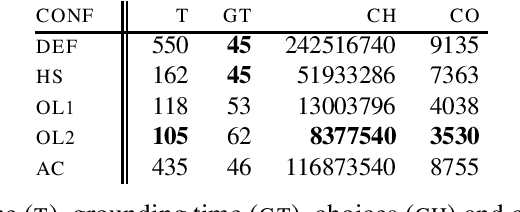
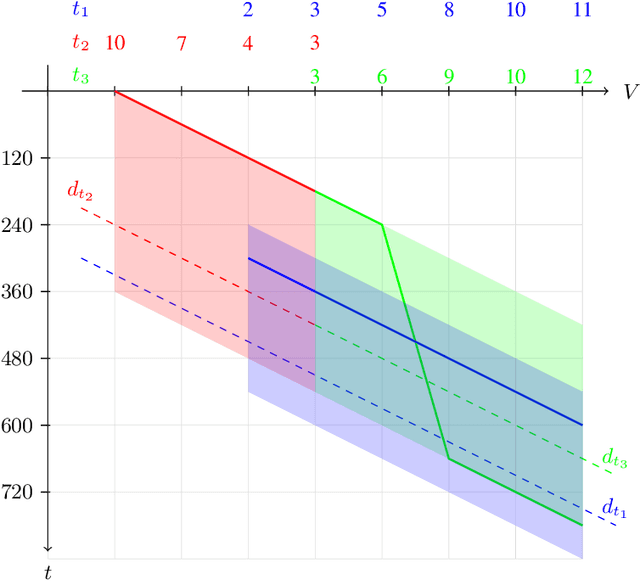
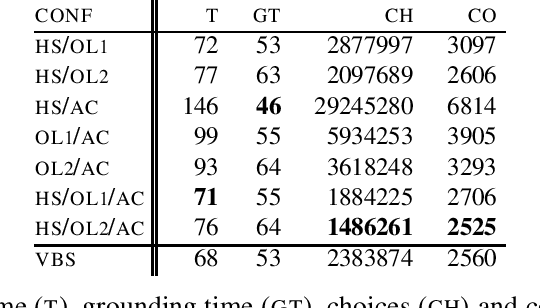
Abstract:We present a solution to real-world train scheduling problems, involving routing, scheduling, and optimization, based on Answer Set Programming (ASP). To this end, we pursue a hybrid approach that extends ASP with difference constraints to account for a fine-grained timing. More precisely, we exemplarily show how the hybrid ASP system clingo[DL] can be used to tackle demanding planning-and-scheduling problems. In particular, we investigate how to boost performance by combining distinct ASP solving techniques, such as approximations and heuristics, with preprocessing and encoding techniques for tackling large-scale, real-world train scheduling instances. Under consideration in Theory and Practice of Logic Programming (TPLP)
Clingo goes Linear Constraints over Reals and Integers
Jul 13, 2017
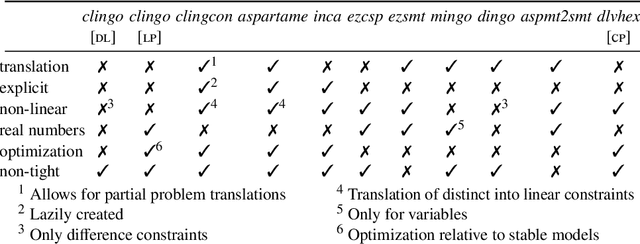
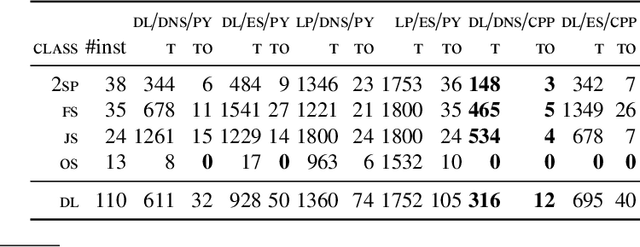
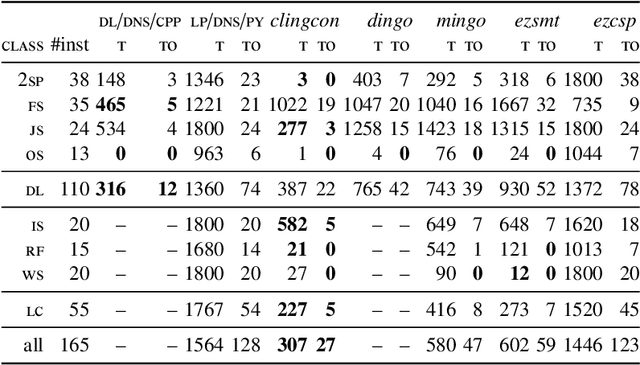
Abstract:The recent series 5 of the ASP system clingo provides generic means to enhance basic Answer Set Programming (ASP) with theory reasoning capabilities. We instantiate this framework with different forms of linear constraints, discuss the respective implementations, and present techniques of how to use these constraints in a reactive context. More precisely, we introduce extensions to clingo with difference and linear constraints over integers and reals, respectively, and realize them in complementary ways. Finally, we empirically evaluate the resulting clingo derivatives clingo[dl] and clingo[lp] on common fragments and contrast them to related ASP systems. This paper is under consideration for acceptance in TPLP.
Clingcon: The Next Generation
May 12, 2017
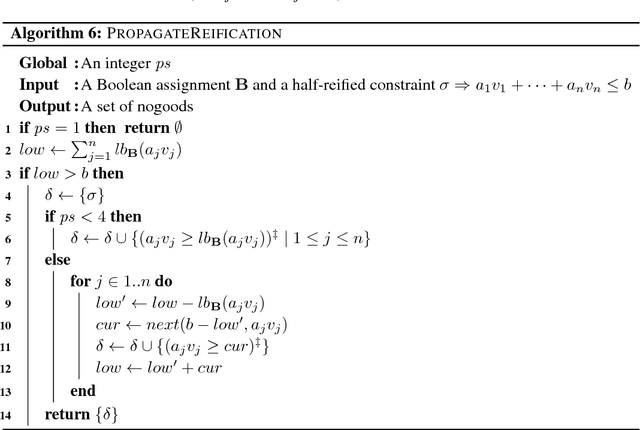

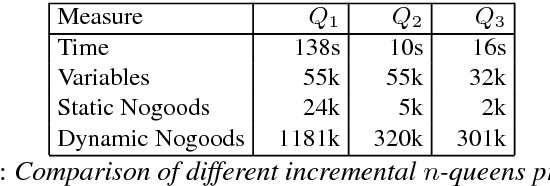
Abstract:We present the third generation of the constraint answer set system clingcon, combining Answer Set Programming (ASP) with finite domain constraint processing (CP). While its predecessors rely on a black-box approach to hybrid solving by integrating the CP solver gecode, the new clingcon system pursues a lazy approach using dedicated constraint propagators to extend propagation in the underlying ASP solver clasp. No extension is needed for parsing and grounding clingcon's hybrid modeling language since both can be accommodated by the new generic theory handling capabilities of the ASP grounder gringo. As a whole, clingcon 3 is thus an extension of the ASP system clingo 5, which itself relies on the grounder gringo and the solver clasp. The new approach of clingcon offers a seamless integration of CP propagation into ASP solving that benefits from the whole spectrum of clasp's reasoning modes, including for instance multi-shot solving and advanced optimization techniques. This is accomplished by a lazy approach that unfolds the representation of constraints and adds it to that of the logic program only when needed. Although the unfolding is usually dictated by the constraint propagators during solving, it can already be partially (or even totally) done during preprocessing. Moreover, clingcon's constraint preprocessing and propagation incorporate several well established CP techniques that greatly improve its performance. We demonstrate this via an extensive empirical evaluation contrasting, first, the various techniques in the context of CSP solving and, second, the new clingcon system with other hybrid ASP systems. Under consideration in Theory and Practice of Logic Programming (TPLP)
Automatic Network Reconstruction using ASP
Jul 28, 2011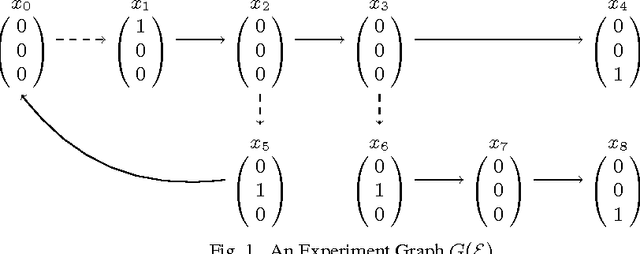

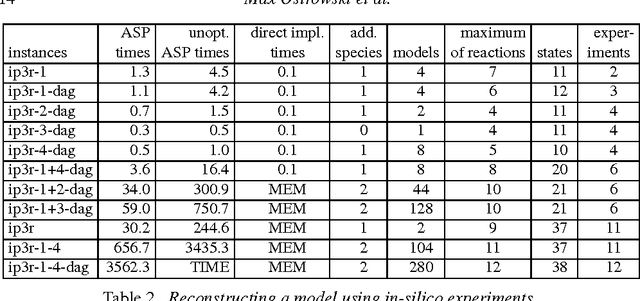

Abstract:Building biological models by inferring functional dependencies from experimental data is an im- portant issue in Molecular Biology. To relieve the biologist from this traditionally manual process, various approaches have been proposed to increase the degree of automation. However, available ap- proaches often yield a single model only, rely on specific assumptions, and/or use dedicated, heuris- tic algorithms that are intolerant to changing circumstances or requirements in the view of the rapid progress made in Biotechnology. Our aim is to provide a declarative solution to the problem by ap- peal to Answer Set Programming (ASP) overcoming these difficulties. We build upon an existing approach to Automatic Network Reconstruction proposed by part of the authors. This approach has firm mathematical foundations and is well suited for ASP due to its combinatorial flavor providing a characterization of all models explaining a set of experiments. The usage of ASP has several ben- efits over the existing heuristic algorithms. First, it is declarative and thus transparent for biological experts. Second, it is elaboration tolerant and thus allows for an easy exploration and incorporation of biological constraints. Third, it allows for exploring the entire space of possible models. Finally, our approach offers an excellent performance, matching existing, special-purpose systems.
 Add to Chrome
Add to Chrome Add to Firefox
Add to Firefox Add to Edge
Add to Edge